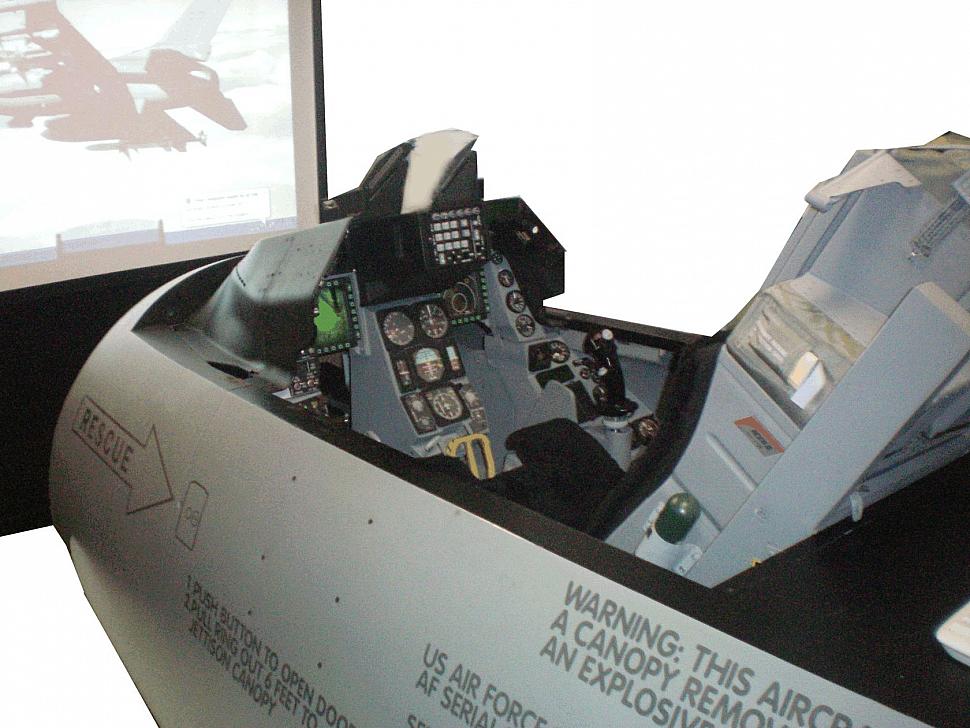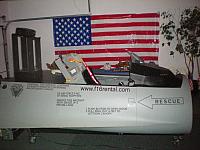Fighter Jet News
F-16 Fighting Falcon News
World's coolest party toy: an F-16 flight simulator
July 7, 2010 (by
Bob Cox) -
Paul Miller has one of the world's coolest party toys: a flight simulator that is pretty much an exact replica of an F-16 fighter jet cockpit. And for a small fee -- well, $500 -- he'll bring it to your event and let the guests play Top Gun.
But making a buck renting out party entertainment isn't Miller's mission in life. He believes, fervently and passionately, that he can convince the U.S. armed forces that he can help them train pilots cheaper, faster and better.
Renting out the F-16 simulator for a party or corporate event is just a means to an end for Miller. The end is penetrating a bureaucratic Defense Department acquisition system.
"I've been trying to raise awareness for most of my two-decade career that it doesn't take $6 million in technology and equipment to train a pilot," said Miller, citing what he says is the approximate cost the Air Force pays to buy a basic F-16 simulator from a major defense contractor.
It's a quixotic quest by the Azle resident, who has been battered, bruised, bankrupted and discouraged by more than a decade of pursuing his novel idea.
For $1 million, and maybe a lot less, Miller says, the military should be able to get simulators made from commercially available, off-the-shelf technology -- computers, software, cockpit instruments and the like.
At that price, he says, the military could buy a lot more simulators, provide more pilot training time and save money for personnel, fuel and other uses. He thinks they could be portable and simple to set up, maintain and operate. Software could be instantly upgraded.
"You can build an entire F-16 [simulator] off the Internet," Miller said.
Several weeks ago, Miller quit his job with Clark Precision Machine to prove his point and resume a quest that he began during the Clinton administration.
With the financial and business backing of retired California attorney Hal Bryman, who also worked as an aerospace engineer, Miller has put together an F-16 simulator using a discarded cockpit body, existing instruments and commercially available software to virtually replicate operation of the aircraft.
For now, Miller is marketing the simulator as entertainment through his company, FS Rentals.
Starting at $500 for eight hours, Miller will bring the simulator to a house or other location and operate it for an event. More money buys more time for more people. He said he did a high school graduation party in Weatherford last week, his second event, and has four more events booked.
The income will help Miller and his wife, Lynn, make ends meet in the here and now. But the goal is to generate cash to upgrade the simulator with new components and bring it up to the standards of the Air Force's latest F-16 version, the Block 50/52.
He hopes to have a realistic product he can pitch to the military, the Defense Department and politicians to show what can be done affordably.
An avid aviation buff from youth, Miller caught the simulator bug while working for Boeing Commercial Electronics building jetliner cockpits in Irving two decades ago.
"I thought, 'I'm not the only one in the world that would love to have a cockpit in the house,'" said Miller. He said the actual cost of labor and materials that went into each cockpit was far less than Boeing charged.
So he started his own company, Desk Top Simulation, with the aim of using then-emerging desktop computer technology to build aircraft simulators. Initially, he found a more viable commercial market in race-car simulators.
Eventually, Miller says, the Navy found him through the Internet and gave him a contract for a simple, reconfigurable flight simulator for its T-34 training aircraft. Miller produced the simulators and said the Navy loved them, but he eventually lost the contract after failing to get a preferred small business certification.
In 2000, Miller sold that business to another Fort Worth company, Arco, which does business as Photo Etch. A few years later, after being laid off, Miller and his wife bought back the company name, took over its liabilities and tried to resume where they left off.
When that didn't work out, the couple put the company into bankruptcy, and Miller took a job with Clark Precision in Azle, which builds simulator equipment for other defense contractors. After several years with Clark and working in the military contracting system with companies like Lockheed Martin, Miller said he decided to take another shot at proving a low-cost military training system based on readily available components.
"I've got to give it at least one more shot," said Miller, whose goal is to develop a system so affordable and portable that the military could buy a dozen or more for every base. With the simulators networked together -- a technology already in use in much higher-priced systems -- several pilots could train together.
"If one pilot's life is saved, if $25 million, $50 million, $100 million of government money is saved, then I've accomplished my mission," Miller said.
So he's taking his F-16 simulator to garages and offices and exhibit halls, generating some income and hoping that someone -- a congressman, a military pilot or even an influential veteran -- will see it, listen to his story and help carry his message about saving the taxpayers millions of dollars.
"I believe," said Miller, "if I build it they will come."
Renting out the F-16 simulator for a party or corporate event is just a means to an end for Miller. The end is penetrating a bureaucratic Defense Department acquisition system.
"I've been trying to raise awareness for most of my two-decade career that it doesn't take $6 million in technology and equipment to train a pilot," said Miller, citing what he says is the approximate cost the Air Force pays to buy a basic F-16 simulator from a major defense contractor.
It's a quixotic quest by the Azle resident, who has been battered, bruised, bankrupted and discouraged by more than a decade of pursuing his novel idea.
For $1 million, and maybe a lot less, Miller says, the military should be able to get simulators made from commercially available, off-the-shelf technology -- computers, software, cockpit instruments and the like.
At that price, he says, the military could buy a lot more simulators, provide more pilot training time and save money for personnel, fuel and other uses. He thinks they could be portable and simple to set up, maintain and operate. Software could be instantly upgraded.
"You can build an entire F-16 [simulator] off the Internet," Miller said.
Several weeks ago, Miller quit his job with Clark Precision Machine to prove his point and resume a quest that he began during the Clinton administration.
With the financial and business backing of retired California attorney Hal Bryman, who also worked as an aerospace engineer, Miller has put together an F-16 simulator using a discarded cockpit body, existing instruments and commercially available software to virtually replicate operation of the aircraft.
For now, Miller is marketing the simulator as entertainment through his company, FS Rentals.
Starting at $500 for eight hours, Miller will bring the simulator to a house or other location and operate it for an event. More money buys more time for more people. He said he did a high school graduation party in Weatherford last week, his second event, and has four more events booked.
The income will help Miller and his wife, Lynn, make ends meet in the here and now. But the goal is to generate cash to upgrade the simulator with new components and bring it up to the standards of the Air Force's latest F-16 version, the Block 50/52.
He hopes to have a realistic product he can pitch to the military, the Defense Department and politicians to show what can be done affordably.
An avid aviation buff from youth, Miller caught the simulator bug while working for Boeing Commercial Electronics building jetliner cockpits in Irving two decades ago.
"I thought, 'I'm not the only one in the world that would love to have a cockpit in the house,'" said Miller. He said the actual cost of labor and materials that went into each cockpit was far less than Boeing charged.
So he started his own company, Desk Top Simulation, with the aim of using then-emerging desktop computer technology to build aircraft simulators. Initially, he found a more viable commercial market in race-car simulators.
Eventually, Miller says, the Navy found him through the Internet and gave him a contract for a simple, reconfigurable flight simulator for its T-34 training aircraft. Miller produced the simulators and said the Navy loved them, but he eventually lost the contract after failing to get a preferred small business certification.
In 2000, Miller sold that business to another Fort Worth company, Arco, which does business as Photo Etch. A few years later, after being laid off, Miller and his wife bought back the company name, took over its liabilities and tried to resume where they left off.
When that didn't work out, the couple put the company into bankruptcy, and Miller took a job with Clark Precision in Azle, which builds simulator equipment for other defense contractors. After several years with Clark and working in the military contracting system with companies like Lockheed Martin, Miller said he decided to take another shot at proving a low-cost military training system based on readily available components.
"I've got to give it at least one more shot," said Miller, whose goal is to develop a system so affordable and portable that the military could buy a dozen or more for every base. With the simulators networked together -- a technology already in use in much higher-priced systems -- several pilots could train together.
"If one pilot's life is saved, if $25 million, $50 million, $100 million of government money is saved, then I've accomplished my mission," Miller said.
So he's taking his F-16 simulator to garages and offices and exhibit halls, generating some income and hoping that someone -- a congressman, a military pilot or even an influential veteran -- will see it, listen to his story and help carry his message about saving the taxpayers millions of dollars.
"I believe," said Miller, "if I build it they will come."
Originally published on June 20, 2010 in the Star-Telegram.
Used with permission from Bob Cox, Star-Telegram
© 2010 Star-Telegram.
For rentals refer to FSRentals
Related articles:
External link:
Forum discussion:
Tags
- F-16 flight simulator running on 120 PC graphic cards (2009-06-11)
- Lockheed Martin delivers F-16I Flight Simulator (2008-07-24)
- Get a free F-16 ride, sponsored by Google (2007-09-06)
- F-16 Fighting Falcon news archive
External link:
- F-16 Simulator Rental ( Youtube Video)
Forum discussion:
- F-16 Simulator Rental ( 7 replies)
Tags


